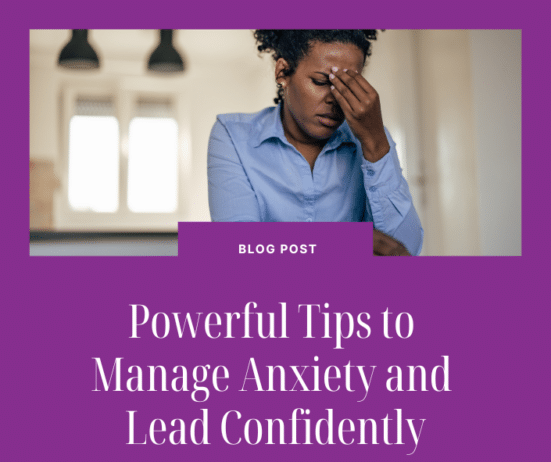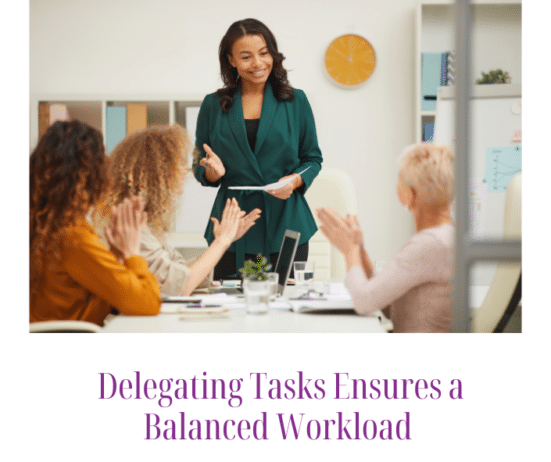July 8, 2024
Imagine walking into a room where every face is familiar but none like yours. For many Black women in mid to senior careers, this is not just an occasional occurrence but a daily reality. Making it difficult to manage anxiety. According to the TIAA Institute, Black women are significantly underrepresented in corporate leadership roles, making up 4.5% of women Fortune 500 CEOs and only .4% of all Fortune 500 CEOs. This stark underrepresentation often leads to feelings of isolation and heightened anxiety, making the path to confident leadership fraught with emotional hurdles.
The journey of a Black woman in corporate America is often marked by a unique set of challenges. Despite their qualifications and achievements, many find themselves battling self-doubt and imposter syndrome. The constant need to prove oneself in environments where they are frequently the only Black woman can take a significant toll on their mental and emotional well-being. This blog aims to address these issues by offering practical, actionable tips to manage anxiety and enhance leadership confidence.

Understanding Anxiety in Leadership
Anxiety is more than just a fleeting feeling of nervousness. For me, anxiety was a persistent companion that severely impacted my ability to lead through the first two decades of my career. When Black women are in leadership roles, our anxiety often stems from both personal and professional pressures. Both of which are often compounded by societal expectations and the constant need to be on guard because of racial barriers.
Types of Anxiety of Include
- Fear of Failure: The pressure to succeed can be overwhelming, leading to a paralyzing fear of making mistakes.
- Social Anxiety: Interacting in predominantly white spaces can heighten feelings of self-consciousness and fear of judgment. This is exactly what I experienced with social anxiety. You can read about my journey with social anxiety here in this blog, 5 Steps I Used to Break Through Social Anxiety.
- Performance Anxiety: The need to constantly prove one’s worth can lead to an unrelenting focus on performance, often to the detriment of mental health.
- General Anxiety Disorder: General anxiety disorder (GAD) is a medical diagnosis that is provided by a licensed professional such as licensed counselors, psychologists, psychiatrists, and your primary care doctors. It should be noted that professional certified coaches are not licensed mental health professionals. We do not provide medical diagnoses, medication, or medical treatment for anxiety.
How Anxiety Shows Up
When we are anxious, anxiety can show up in various ways, including:
- Physical Reactions: Increased heart rate, nausea, blurry vision, sweating, and fatigue.
- Emotional Reactions: Feelings of dread, feeling like the “other shoe” is about to drop, irritability, easily frustrated, and a sense of impending doom.
- Cognitive Reactions: Difficulty concentrating, self-doubt, racing thoughts, and negative self-talk.
When these effects are present, they impair our decision-making abilities. You will also experience reduced productivity, which hinders your ability to lead effectively. You tend to make poor decisions that that in you taking on all responsibility for everything.

Common Anxiety Triggers and Cultural Expectations
High-stress careers often come with demanding deadlines, high expectations, and constant scrutiny. These factors contribute significantly to stress and fear of failure. Additionally, the pressure to conform to societal norms while striving to shatter racial stereotypes can amplify stress. Understanding these triggers helps in developing the right strategies to help you manage anxiety effectively.
Mini Case Study
Consider the story of Michelle Davis (all names have been changed), a successful executive. Despite her impressive credentials and achievements, Michelle constantly battled with the fear of failure. Consistently doubting her performance. She felt immense pressure to outperform her peers to gain the same recognition, which led to sleepless nights and relentless self-criticism. By seeking support through my coaching program, Michelle gradually learned to manage the effects of her anxiety. She was able to leave behind the self-criticism which transformed her life from one of daily fear to leading with full confidence.
Leadership and Anxiety
Understanding the types of anxiety and their impact on leadership is the first step towards managing it. By recognizing the manifestations and identifying common triggers, Black women in leadership can begin to address their fear proactively, paving the way for more confident and effective leadership.
Identifying and Challenging Negative Self-Talk to Manage Anxiety
Negative self-talk is a powerful force that can either elevate fear and anxiety. It often creeps in unnoticed, influencing how we perceive our abilities and our potential for success. For many in leadership positions, this internal dialogue can become a barrier to effective and confident leadership. When you constantly doubt yourself, you don’t always trust others enough to delegate
Common Negative Thoughts
Negative self-talk often manifests as thoughts like “I’m not good enough” or “I’ll fail”. “I’ll never make it.” “Things always go wrong.” These thoughts can be deeply ingrained, often stemming from past experiences or societal expectations. They create a mental environment where anxiety thrives, reinforcing feelings of inadequacy and self-doubt.
Manage Anxiety with These Techniques
Challenging these negative thoughts requires a combination of cognitive restructuring, affirmations, and mindfulness practices. Cognitive restructuring involves identifying and disputing irrational or maladaptive thoughts. Affirmations are positive statements that reinforce self-worth and capability. Such as those found in my affirmations journal for Black women, titled “Melaninated Magic: 180 Affirmations to Nurture Your Soul and Unleash Your Black Girl Joy”. I created these affirmations specifically with Black women in mind. Mindfulness practices help in becoming aware of these thoughts without judgment, learn how to be present, which allows for a more balanced and calm perspective.
For example, during stressful situations, negative self-talk tends to be more pronounced. In calm situations, however, it is easier to practice positive affirmations and mindfulness. Recognizing this difference can help in developing strategies to counteract negative thoughts when they are most likely to arise.
Mini Case Study
Linda, a mid-career manager constantly doubted her capabilities. She often thought, “I’m not qualified enough to lead this team.” With coaching, Linda was able to learn to manage and recognize her negative thoughts and challenge them with positive affirmations like “I have the experience and skills to lead successfully.” We paired this action with several anxiety tools for her to practice daily. This shift in mindset reduced her fear and significantly boosted her confidence, which enabled her to lead more effectively.
Building a Personal Board of Directors to Manage Anxiety
Having a supportive community is crucial for managing fear and enhancing leadership capabilities. A strong support network provides emotional comfort, professional guidance, and a sense of belonging, which are essential for personal and professional growth.
Building Your Board
Support can come in various forms, including mentorship, peer support groups, and professional networks. Mentorship provides guidance and wisdom from those who have navigated similar paths. Peer support groups offer a safe space to share experiences and strategies. Professional networks open doors to opportunities and resources that might otherwise be inaccessible.
How to Find Support
Building a support network requires proactive networking and seeking out the right groups or mentors. Attending industry events, joining professional associations, and engaging in online communities are effective ways to connect with potential mentors and peers.
A support network provides both emotional and professional benefits. Emotionally, it offers validation, encouragement, and a sense of belonging. Professionally, it provides insights, feedback, and opportunities for career advancement. Investing in a culturally sensitive career coach is an excellent way to start your personal board of directors if you are struggling to find support.
Mini Case Study
Consider Janet, who felt isolated in her high-ranking position. By joining a professional network for women leaders and finding a mentor, she gained valuable insights and emotional support. This network helped her manage her fears and grow in her career, demonstrating the power of a strong support system.

Practical Techniques to Manage Anxiety
Managing your fear and stress effectively involves adopting practical strategies that can be integrated into daily routines and professional environments. These strategies range from simple daily practices to more structured long-term approaches.
Daily Practices
Incorporating daily practices such as breathing exercises, meditation, and physical activity can significantly reduce fear and stress. Breathing exercises help in calming the mind, meditation fosters mindfulness, and physical activity releases endorphins that improve mood.
Workplace Strategies
In the workplace, managing anxiety involves time management, setting boundaries, and delegating tasks. Effective time management reduces the stress of tight deadlines, setting boundaries prevents burnout, and delegating tasks ensures a balanced workload.
Long-term Techniques
Long-term techniques include therapy, coaching, and continuous learning. Therapy provides a safe space to explore and address underlying issues if anxiety is significantly disrupting your life, coaching offers personalized strategies and support, and continuous learning keeps skills sharp and fosters a growth mindset.
Which techniques are most effective in high-pressure environments? Techniques like time management and setting boundaries are particularly effective. Incorporating these into a busy schedule can be challenging but is crucial for maintaining mental well-being.

Embracing Leadership with Confidence
Building confidence in leadership involves self-awareness and continuous improvement. It requires regular self-reflection, setting achievable goals, and celebrating successes, both big and small.
Self-Reflection
Regular self-reflection helps in assessing strengths and areas for growth. It involves taking time to evaluate past experiences, identifying what worked well and what didn’t, and using these insights to inform future actions.
Setting Goals
Setting both short-term and long-term career goals provides direction and motivation. Short-term goals offer immediate targets to strive for, while long-term goals keep the bigger picture in focus. This approach ensures a balanced progression towards overall career objectives. Goal-setting plays a significant role in building confidence. It provides a clear roadmap and a sense of achievement as each goal is met.
Celebrating Successes
Recognizing and celebrating achievements is crucial for building confidence. It reinforces the value of hard work and provides motivation to continue striving for excellence. Celebrations can range from acknowledging daily accomplishments to marking major milestones. Effective ways to celebrate successes include sharing achievements with a mentor or support group and taking time to reflect on the journey.
Wrapping It Up
In this blog, we explored Powerful Tips to Manage Anxiety and Lead Confidently, providing you with practical strategies to enhance your mental well-being and leadership skills. Here’s a recap of the key points discussed:
- Understanding the Root Causes of Anxiety: We delved into the importance of identifying the underlying triggers of your anxiety. Recognizing these causes is the first step towards effectively managing anxiety.
- Implementing Mindfulness Practices: We highlighted the benefits of mindfulness techniques such as meditation, deep breathing exercises, and mindful journaling. These practices can help you stay grounded and manage anxiety in the moment.
- Building a Strong Support System: We discussed the importance of surrounding yourself with a supportive network of friends, family, and colleagues. A robust support system can provide encouragement and help you manage anxiety more effectively.
- Developing a Routine: Establishing a consistent daily routine can bring a sense of order and predictability to your life, which is crucial in reducing anxiety levels. This includes regular exercise, healthy eating habits, and adequate sleep.
- Seeking Professional Help: Sometimes, managing anxiety on your own isn’t enough. Seeking help from a mental health professional or anxiety coach can provide you with tailored strategies to manage anxiety effectively.
I encourage you to implement these powerful tips to manage anxiety and lead confidently. Reflect on your experiences and see how these techniques can transform your approach to anxiety management and leadership. Start by identifying your anxiety triggers, practice mindfulness daily, build and lean on your support system, develop a routine, and don’t hesitate to seek professional help when needed.
Remember, managing anxiety is a journey, not a destination. Embrace each step and be patient with yourself. As Eleanor Roosevelt once said, “You gain strength, courage, and confidence by every experience in which you really stop to look fear in the face. You are able to say to yourself, ‘I lived through this horror. I can take the next thing that comes along.’” Your mental health is the foundation of your ability to lead confidently, so prioritize it and watch as you flourish both personally and professionally.
By focusing on these strategies to manage anxiety, you are not only improving your mental health but also setting the stage for more confident leadership. Take the first step today, and witness the positive impact on your life and career.

I’m an ICF Professional Certified Coach (PCC) and career coach for Twanna Carter Professional & Personal Coaching, LLC. I failed my first career transition from the military so badly, it took me the next 10+ years to build my confidence and recover. I know what it feels like to struggle with imposter syndrome and uncertainty about my worth in the workplace. It’s why I am dedicated to empowering Black women. Helping them navigate change and uncertainty by providing them with the tools and strategies they need to be successful. Schedule a 30-Minute Roadmap session today.
If you enjoyed this blog, please share it. If you’re feeling generous buy me a coffee.
Curated Reads: Essential Books to Add to Your Personal Library
- Soothe Your Nerves: The Black Woman’s Guide to Understanding and Overcoming Anxiety, Panic, and Fear by Dr. Angela Neal-Barnett
- Melaninated Magic: 180 Affirmations to Nurture Your Soul and Unleash Your Black Girl Joy by Twanna Carter, PhD
- I’m Not Yelling: A Black Woman’s Guide to Navigating the Workplace (Successful Black Business Women), Elizabeth Leiba
- Stop Overthinking: 23 Techniques to Relieve Stress, Stop Negative Spirals, Declutter Your Mind, and Focus on the Present (The Path to Calm) by Nick Trenton
- Influence: The Psychology of Persuasion by Robert B. Cialdini
- How to Win Friends and Influence People by Dale Carnegie
- High-Functioning Anxiety: A 5-Step Guide to Calming the Inner Panic and Thriving by Dr. Lalitaa Suglani
- Dare to Lead by Brene Brown
- The Memo, by Minda Harts
- Atomic Habits: An Easy & Proven Way to Build Good Habits & Break Bad Ones, by James Clear
- Worthy: How to Believe You Are Enough and Transform Your Life, by Jamie Kern Lima
- The Secret Thoughts of Successful Women: And Men: Why Capable People Suffer from Impostor Syndrome and How to Thrive in Spite of It – Valerie Young, EdD
Read my latest blogs…
- Why So Many Black Women Executives Secretly Battle Imposter Syndrome (And How They’re Winning Anyway)The Hidden Struggle of Black Women Executives For many Black women executives, professional success often hides a quieter internal struggle… …the… Read more: Why So Many Black Women Executives Secretly Battle Imposter Syndrome (And How They’re Winning Anyway)
- Executive Burnout Recovery – 9 Powerful, Proven StrategiesExecutive Burnout Recovery Executive burnout recovery is not about weakness, failure, or lack of resilience. For Black women executives, it is… Read more: Executive Burnout Recovery – 9 Powerful, Proven Strategies
- The Hidden Cost of Being the Strong One at WorkUnderstanding the “Strong One at Work” Persona There’s always that one person in the office, the one everyone turns to when… Read more: The Hidden Cost of Being the Strong One at Work
- Quiet Cracking: 7 Signs You’re Not ‘Fine’. You’re Burning Out in SilenceQuiet Cracking, When “I’m Fine” Isn’t the Truth You show up. You meet deadlines. You answer messages with a polite “I’m… Read more: Quiet Cracking: 7 Signs You’re Not ‘Fine’. You’re Burning Out in Silence
- Are You Trapped in Survival Mode? The Real Reason It’s Not Your Fault (and What to Do Next)Are You Trapped in Survival Mode? What “Survival Mode” Really Means For many Black women, survival mode isn’t just a phrase,… Read more: Are You Trapped in Survival Mode? The Real Reason It’s Not Your Fault (and What to Do Next)
- Why So Many Smart Black Women Experience Fear of Starting a Business, and Feel Completely StuckThe Quiet Struggle Behind Big Dreams Many intelligent, capable Black women dream of owning a business. They envision freedom, flexibility, financial… Read more: Why So Many Smart Black Women Experience Fear of Starting a Business, and Feel Completely Stuck
- Strategic Career Mapping for Executive Black Women: How to Identify Roles That Reflect Your True StrengthsWhy Strategic Career Mapping Matters More Than Ever In today’s corporate landscape, Strategic Career Mapping has become more than just a… Read more: Strategic Career Mapping for Executive Black Women: How to Identify Roles That Reflect Your True Strengths
- The Fear-Based Leadership Cycle Secretly Running Your Life. And How to Break ItFear is a powerful emotion. It can protect you, warn you, and heighten your awareness. But when fear begins to lead… Read more: The Fear-Based Leadership Cycle Secretly Running Your Life. And How to Break It
- Redefining Success. How Black Women Executives Are Leading a New Era of Authentic LeadershipThe New Leadership Trend. Redefining Success Across boardrooms, Zoom calls, and LinkedIn feeds, a powerful shift is underway. Women of color,… Read more: Redefining Success. How Black Women Executives Are Leading a New Era of Authentic Leadership
- How to Quiet the Inner Critic and Stop Second-Guessing Yourself in High-Stakes RoomsUnderstanding the Inner Critic Your inner critic is that persistent internal voice that judges, doubts, and second-guesses you. Ooften at the… Read more: How to Quiet the Inner Critic and Stop Second-Guessing Yourself in High-Stakes Rooms
- The Survival Blueprint. What To Do Immediately When You Realize You’re Being Managed OutUnderstanding What “Being Managed Out” Really Means. And Why Immediate Help Matters The first time I realized I was being managed… Read more: The Survival Blueprint. What To Do Immediately When You Realize You’re Being Managed Out
- 10 Powerful Reasons Why Black Women Entrepreneurs Are Leading the Rise of EntrepreneurshipWhy Black Women Entrepreneurs Are Leading the Rise of Entrepreneurship Entrepreneurship has always symbolized courage, innovation, and self-determination. And no one… Read more: 10 Powerful Reasons Why Black Women Entrepreneurs Are Leading the Rise of Entrepreneurship



















+ show Comments
- Hide Comments
add a comment